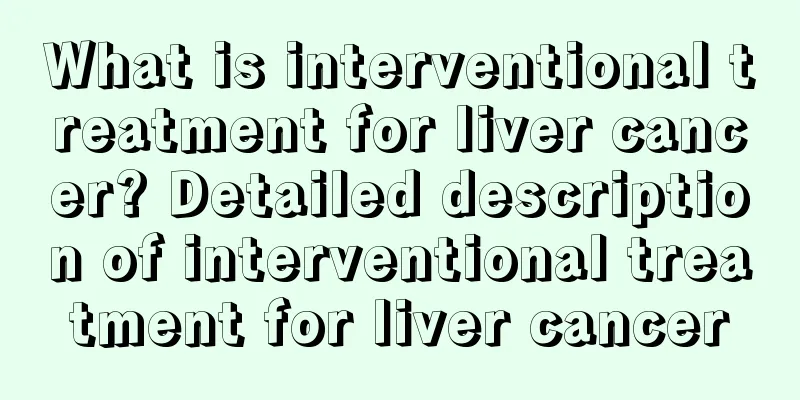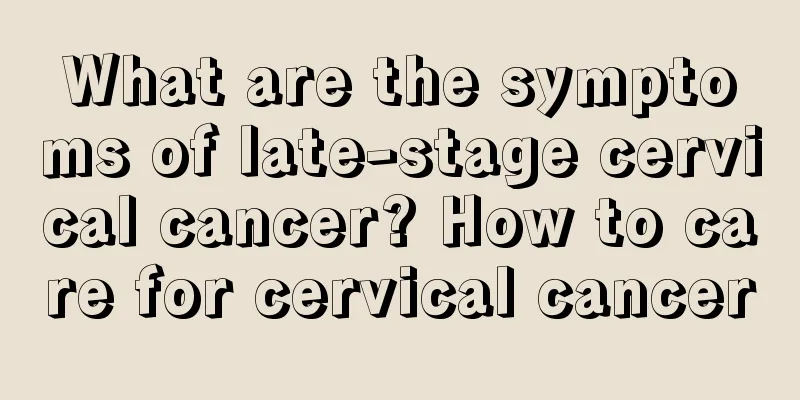What is interventional treatment for liver cancer? Detailed description of interventional treatment for liver cancer

|
What is interventional treatment for liver cancer? Interventional treatment is one of the more effective treatments for early liver cancer. Below we will further answer this question for you. The most commonly used technique for interventional treatment of liver cancer is hepatic arterial chemoembolization, which involves inserting a catheter into the hepatic artery via arterial puncture, and then super-selectively inserting a catheter into the tumor's blood supply artery to inject chemotherapy drugs and iodized oil chemotherapy emulsion, thereby performing local high-concentration chemotherapy on the tumor and embolizing the tumor's nourishing blood vessels, eliminating the tumor's blood supply, and achieving the dual effects of "killing the tumor with drugs + starving it to death," according to the study. For small hepatocellular carcinomas with a diameter of less than 5 cm, microcatheter technology is used to super-selectively cannulate the hepatic segmental or subsegmental arteries, and a large amount of iodized oil chemotherapy drug emulsion is injected under pressure to completely fill the terminal arterioles and venules of the tumor, so as to achieve the purpose of medical hepatic segment resection. If TACE is combined with local radiofrequency ablation or microwave therapy, the therapeutic effect can be similar to that of surgical resection, and it is superior to surgical treatment in terms of safety, recurrence rate, repeatability, complication rate and indications. For advanced liver cancer with large or numerous tumors, TACE is the preferred non-surgical treatment method, which can effectively control the local growth rate of the tumor, significantly relieve clinical symptoms such as abdominal pain, and improve the patient's quality of life. However, a single TACE operation has limited therapeutic effect on liver cancer. Multiple embolizations can achieve the maximum tumor necrosis rate and prolong the patient's survival. The interval between TACE operations is determined according to the tumor's response and the patient's condition, usually 4-12 weeks. |
<<: What is ablation therapy for liver cancer? Analysis of ablation therapy for liver cancer
>>: What are the early symptoms of liver cancer? 5 early symptoms of liver cancer
Recommend
What is the reason for butthole hair
When summer comes, many women go to beauty salons...
How long can you live if you find uterine cancer in the middle stage
Endometrial cancer is one of the common gynecolog...
The egg yolk is black
Under normal circumstances, the yolk of an egg is...
These 5 types of people are prone to cancer, but they don't have to be afraid if they take good precautions
Although cancer can be prevented and treated with...
What are the treatments for tinea cruris?
Tinea cruris is a common skin disease in clinical...
Low red blood cell count in pregnant women?
Nowadays, people pay great attention to eugenics ...
How is dental plaque formed?
The appearance of dental plaque not only affects ...
The correct way to escape when a fire occurs in a high-rise building
Fire is a type of accident. It can be caused by m...
What are the symptoms of internal hemorrhoid bleeding?
Internal hemorrhoids are a relatively common type...
How to match the diet for lung cancer? Four things to pay attention to in the diet of lung cancer patients
Kitchen fume is one of the high-risk factors for ...
What to do if the knee ligament is strained? The treatment method is like this
Knee ligament sprain is a common sports injury th...
Benefits of washing hair with white vinegar
Maybe few of our friends would use white vinegar ...
What is the reason for the redness of yellow urine
Many doctors can judge the patient's conditio...
Experts explain the main signs of uterine cancer
There are some signs before uterine cancer occurs...
How to detoxify the kidneys, teach you 6 little methods
The kidneys are a very important detoxification s...









